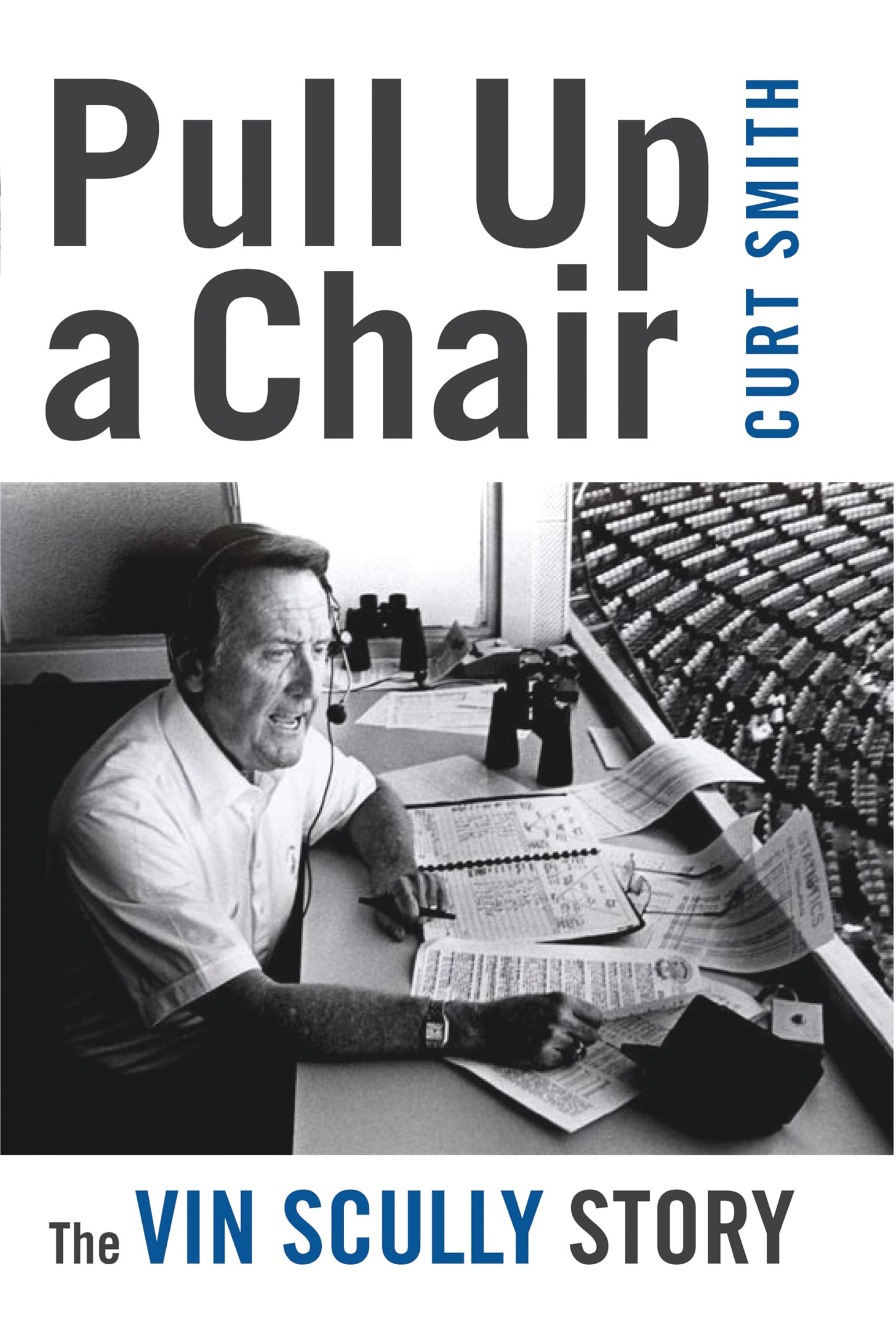Pull Up a Chair: The Vin Scully Story by Curt Smith
Pull Up a Chair: The Vin Scully Story by Curt Smith is the long overdue biography of the longtime Dodgers announcer.
I’ve had the paperback since 2014 but it took about a decade to finally get around to reading it. It was certainly worth the wait although I regret not getting around to reading it while Scully was alive. The book was initially published in 2009, during Scully’s 59th season broadcasting the club. He would ultimately retire at age 88 following the 2016 season, having worked a record 67 years behind the mic with the club.
Smith has a way with the prose. A longtime journalist, Smith also worked as a presidential speechwriter during President George H.W. Bush’s administration. He draws on his previous books about baseball broadcasters, including 1992’s Voices of the Game.
Nationally televised broadcasts were very different during Scully’s time and since TV came into prominence in the 1950s. Scully called both golf and NFL for CBS Sports during 1975-82. NBC Sports hired him as their #1 play-by-play announcer during the 1983-89 seasons. Additionally, he worked the World Series for CBS Radio from 1979-82 and 1990-97. ESPN Radio made Scully an offer after picking up the rights but he declined. Meanwhile, there are no shortage of awards and Hall of Fame honors, including the Ford C. Frick Award in 1982.
The then-New York Giants fan enrolled at Fordham University after a stint in the U.S. Navy. Red Barber hired him to call a college football game at Fenway Park and history would never again be the same. Replacing Ernie Harwell on the Brooklyn Dodgers broadcasts in 1950, Scully joined a booth that included Barber and Connie Desmond. He would take Barber’s approach in being an objective announcer rather than a homer for the team. The same applied when the Dodgers left for Los Angeles in 1958. A salary dispute led to Scully taking Barber’s spot on the NBC broadcast in 1953, making him the youngest broadcaster to call a World Series game. Barber left the Dodgers to broadcast the New York Yankees in 1954, making Scully the principal broadcaster—a title he would keep until retiring.
“Vinny took my place, which I consider my greatest contribution to baseball,” Harwell remarked back in 2007.
Scully has had the pleasure of calling no-hitters and perfect games, amongst his many accomplishments behind the mic. One of those games just happened to be Sandy Koufax’s perfect game on September 9, 1965. Rather than just read the three pages with Scully’s voice playing in my head, I did the next best thing: find his ninth inning call on YouTube. It just speaks to Scully’s genius as a broadcaster and why he was one of the broadcasting greats, perhaps even the greatest of his generation.
Working both Dodgers and national broadcasts sometimes meant doing double duty. It is nothing like it is in today’s era. One such example is a June 1989 game on NBC matching up the St. Louis Cardinals and Chicago Cubs. It went 10 innings and Scully subsequently flew down to Houston for the Dodgers-Astros matchup, which ended up going into extra innings. He picked up the remaining 13 innings of the 22-inning game to turn in a total of 23 innings in one day.
There are plenty of anecdotes throughout the book, including comments from other broadcasters. This includes just a few seasons before Scully joined the booth as Jackie Robinson made his Dodgers debut during the 1947 season. Joe Buck was only 27-years-old when Fox named him their lead announcer for MLB telecasts, calling his first World Series in 1996—“When I think of who went before, it sends chills up your spine.”
Can you imagine a world where Vin Scully was named as the MLB Commissioner? His name was floated—if only by journalist Bob Oates—to replace William D. Eckert, who resigned as MLB’s fourth commissioner in 1968. Oates went as far as to compare Scully to NFL commissioner Pete Rozelle.
While Scully didn’t retire until after the 2016 season, one reason why he put it off was because of boredom. Both golf and just sitting around with friends for lunch got old during the 1994-95 strike.
“It made me realize that if I retired I’d be bored. I found that I’m not the type to just sit on the porch and watch the sunset.
Case in point, here’s how he started his first post-strike Dodgers broadcast: “After being away, I’ve come to the realization that I need you more than you need me.”
The late 1990s meant a transition from how Scully prepared for the game. He had been old-school, cutting out news clippings and placed them in the visiting team’s media guide to prepare for a broadcast. The internet changed all this. What once took hours now only took mere minutes in finding articles and printing them out.
Pull Up a Chair: The Vin Scully Story is as much a biography on Scully as it is a history of broadcasting the sport. There will never be another Vin Scully.




